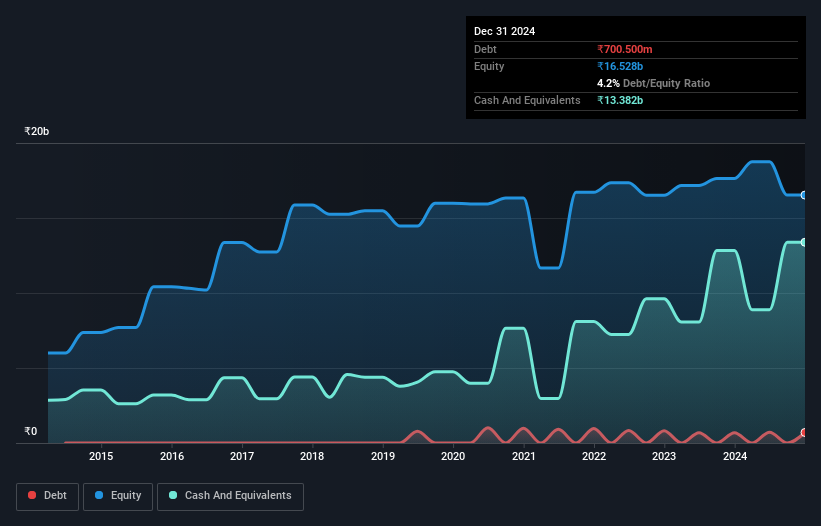- India
- /
- Personal Products
- /
- NSEI:COLPAL
We Think Colgate-Palmolive (India) (NSE:COLPAL) Can Manage Its Debt With Ease
David Iben put it well when he said, 'Volatility is not a risk we care about. What we care about is avoiding the permanent loss of capital.' It's only natural to consider a company's balance sheet when you examine how risky it is, since debt is often involved when a business collapses. We can see that Colgate-Palmolive (India) Limited (NSE:COLPAL) does use debt in its business. But the real question is whether this debt is making the company risky.
Why Does Debt Bring Risk?
Debt is a tool to help businesses grow, but if a business is incapable of paying off its lenders, then it exists at their mercy. Part and parcel of capitalism is the process of 'creative destruction' where failed businesses are mercilessly liquidated by their bankers. However, a more frequent (but still costly) occurrence is where a company must issue shares at bargain-basement prices, permanently diluting shareholders, just to shore up its balance sheet. By replacing dilution, though, debt can be an extremely good tool for businesses that need capital to invest in growth at high rates of return. The first thing to do when considering how much debt a business uses is to look at its cash and debt together.
View our latest analysis for Colgate-Palmolive (India)
What Is Colgate-Palmolive (India)'s Debt?
As you can see below, Colgate-Palmolive (India) had ₹700.5m of debt, at September 2024, which is about the same as the year before. You can click the chart for greater detail. But on the other hand it also has ₹13.4b in cash, leading to a ₹12.7b net cash position.

How Healthy Is Colgate-Palmolive (India)'s Balance Sheet?
According to the last reported balance sheet, Colgate-Palmolive (India) had liabilities of ₹15.2b due within 12 months, and liabilities of ₹773.6m due beyond 12 months. Offsetting this, it had ₹13.4b in cash and ₹2.06b in receivables that were due within 12 months. So it has liabilities totalling ₹516.8m more than its cash and near-term receivables, combined.
This state of affairs indicates that Colgate-Palmolive (India)'s balance sheet looks quite solid, as its total liabilities are just about equal to its liquid assets. So it's very unlikely that the ₹685.0b company is short on cash, but still worth keeping an eye on the balance sheet. Despite its noteworthy liabilities, Colgate-Palmolive (India) boasts net cash, so it's fair to say it does not have a heavy debt load!
And we also note warmly that Colgate-Palmolive (India) grew its EBIT by 11% last year, making its debt load easier to handle. When analysing debt levels, the balance sheet is the obvious place to start. But ultimately the future profitability of the business will decide if Colgate-Palmolive (India) can strengthen its balance sheet over time. So if you want to see what the professionals think, you might find this free report on analyst profit forecasts to be interesting.
Finally, a business needs free cash flow to pay off debt; accounting profits just don't cut it. While Colgate-Palmolive (India) has net cash on its balance sheet, it's still worth taking a look at its ability to convert earnings before interest and tax (EBIT) to free cash flow, to help us understand how quickly it is building (or eroding) that cash balance. Over the most recent three years, Colgate-Palmolive (India) recorded free cash flow worth 73% of its EBIT, which is around normal, given free cash flow excludes interest and tax. This free cash flow puts the company in a good position to pay down debt, when appropriate.
Summing Up
While it is always sensible to look at a company's total liabilities, it is very reassuring that Colgate-Palmolive (India) has ₹12.7b in net cash. The cherry on top was that in converted 73% of that EBIT to free cash flow, bringing in ₹12b. So we don't think Colgate-Palmolive (India)'s use of debt is risky. There's no doubt that we learn most about debt from the balance sheet. However, not all investment risk resides within the balance sheet - far from it. To that end, you should be aware of the 1 warning sign we've spotted with Colgate-Palmolive (India) .
If, after all that, you're more interested in a fast growing company with a rock-solid balance sheet, then check out our list of net cash growth stocks without delay.
New: AI Stock Screener & Alerts
Our new AI Stock Screener scans the market every day to uncover opportunities.
• Dividend Powerhouses (3%+ Yield)
• Undervalued Small Caps with Insider Buying
• High growth Tech and AI Companies
Or build your own from over 50 metrics.
Have feedback on this article? Concerned about the content? Get in touch with us directly. Alternatively, email editorial-team (at) simplywallst.com.
This article by Simply Wall St is general in nature. We provide commentary based on historical data and analyst forecasts only using an unbiased methodology and our articles are not intended to be financial advice. It does not constitute a recommendation to buy or sell any stock, and does not take account of your objectives, or your financial situation. We aim to bring you long-term focused analysis driven by fundamental data. Note that our analysis may not factor in the latest price-sensitive company announcements or qualitative material. Simply Wall St has no position in any stocks mentioned.
About NSEI:COLPAL
Colgate-Palmolive (India)
Manufactures and trades in personal and oral care products in India.
Flawless balance sheet with acceptable track record.
Market Insights
Community Narratives



